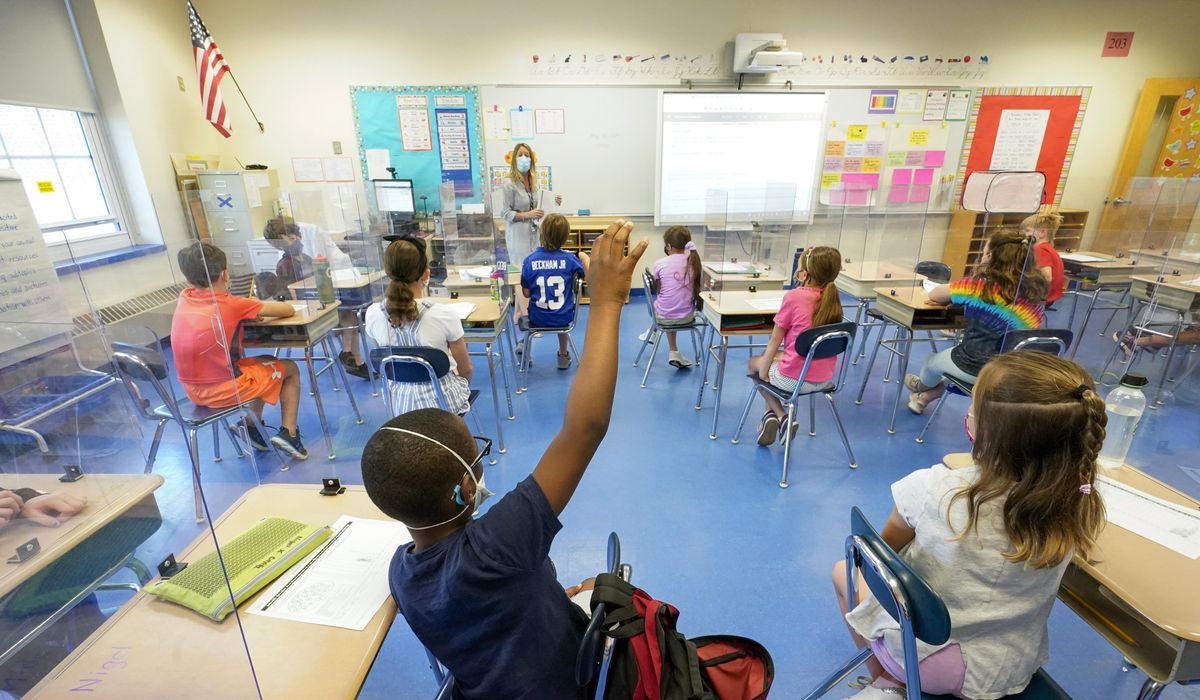
A report by a free speech advocacy group has sparked debate over whether state laws banning critical race theory from classrooms are chilling free speech or simply letting parents protect their children from politics.
The New York-based nonprofit PEN America reported Monday that 24 state legislatures introduced 54 bills from January through September to ban “divisive” concepts such as critical race theory from being taught in K-12 schools, higher education and state agencies.
Most of the 54 bills call for limits on discussions of race, racism, gender and American history, according to the report, titled “Educational Gag Orders: Legislative Restrictions on the Freedom to Read, Learn, and Teach.”
Eleven of the bills have become law in nine states. Nine of the new laws target public schools, three address colleges and universities, and six apply to state agencies and institutions. As of Monday, 18 of the bills were pending in the current legislative session and six were pre-filed for 2022.
“This report isn’t about evaluating any particular viewpoint or ideology. It is instead a warning: This type of legislation, which aims to ban even conversation of entire viewpoints or ideologies, is censorship,” Jonathan Friedman, a lead author of the report, told The Washington Times.
Mr. Friedman called the legislation “a slippery, censorious slope.”
“Administrators and school boards need to be willing to hear out parents and respond to genuine concerns, but the answer to what some perceive as a stifling of debate cannot be more stifling,” he said.
“These bills appear designed to chill academic and educational discussions and impose government dictates on teaching and learning. In short: They are educational gag orders,” the report concluded.
Parental rights advocates disputed the PEN America report’s assertions that the laws were stifling free speech.
Tamra Farah, executive director of MomForce at the nonprofit Moms for America, said some teachers abuse academic freedom to “imbue their classrooms with the concept that society is divided into the oppressor and the oppressed,” which confuses children and usurps the educational role of parents.
“The critical race theory in our schools is more a culture than a curriculum, and parents and scholars opposing it has nothing to do with stifling free speech,” Ms. Farah told The Times.
Sheri Few, president of U.S. Parents Involved in Education, challenged the report’s premise.
“Amid the censorship of social media platforms and leftist propaganda pumped through mainstream media outlets, it is laughable that proponents of Critical Race Theory would suggest that restricting racist pedagogy in government schools is a violation of the first amendment of the U.S. Constitution that protects free speech,” Ms. Few said in an email. “On the contrary, CRT violates the Civil Rights Act and the 14th amendment of the U.S. Constitution, and we are so glad to see lawsuits challenging this racist, Marxist pedagogy.”
Developed in graduate and law schools in the 1970s, critical race theory is an analytical tool based on Marxist critical studies. It posits that racism is a foundational element of American society and government and is important in understanding and evaluating U.S. laws, policies and programs.
‘Radical propaganda’
The PEN America report was released in the aftermath of the Nov. 2 elections in Virginia, where parental involvement in education played a key role in Republican victories, and in Colorado, where parent-backed candidates won control of eight county school boards by defeating candidates endorsed by teachers unions.
Andrea Haitz, a Colorado mother of three elected to Mesa County’s school board last week, told The Times that critical race theory has crept into student “equity clubs.” She said local teachers have allowed these clubs to give presentations in their classrooms.
“I have a real problem with that because it should be done after school. From my standpoint as a board member, I think we need to stick with a curriculum that stays in the lane of its subject,” Ms. Haitz said.
Ms. Haitz, who will take the oath of office on Nov. 30, said parents voted for her because they want their children “to be learning about math, science and history, not neo-Marxist ideas.”
“Great teachers tell kids how to think, not what to think,” she said.
Although Colorado has not enacted a ban on divisive topics in the classroom, Texas has done so as part of an effort to help parents veto objectionable content.
Jonathan Zimmerman, a historian of education at the University of Pennsylvania, said the PEN America report confirms that parents do not trust teachers or students to discuss the “urgent” and “controversial” issue of race and racism.
“The real problem here is that we don’t trust our teachers — or our students — enough to let them debate the question of race in America,” Mr. Zimmerman told The Times. “Of course, reasonable people can and do disagree about that. But the GOP-sponsored measures effectively take the question off the table.”
Free speech scholar Jeffrey A. Sachs, a political scientist at Acadia University, took issue with the vagueness of the state bans. He said the study shows the need for parents, teachers, local administrators and the students “on the ground” to figure out how to discuss topics like race.
“A total separation of politics from education is neither possible nor desirable,” Mr. Sachs told The Times.
“Where these bills go wrong is in leveling a vague, one-size-fits-all type approach on an entire state, and then enforcing that standard with threats of harsh punishment. That’s a recipe for paranoia and self-censorship,” he added.
James Grossman, executive director of the American Historical Association, said state bans noted in the report are “part of a larger campaign of radical propaganda that aims to divide the American people by spreading mistruths about what is happening in the nation’s history classrooms.
“A recent national survey, conducted by the American Historical Associaton and Fairleigh Dickinson University, demonstrates a broad consensus across partisan lines that what actually is being taught in schools — the history of slavery and racism and its impact on the development of American society — is essential content and wholly appropriate for school history classes,” Mr. Grossman said.
But Melanie Hempe, founder of the nonprofit Families Managing Media, said it would be better to leave hot-button topics to parents than trust schools to work out compromises that please everyone.
“A lot of these things need to stay in the home,” said Ms. Hempe, citing an “anchoring bias” that makes children susceptible to the first person who teaches them about a topic.
“Kids are constantly exposed to politics and topics at ages when they’re not ready,” she said. “They need parents to guide them through what they hear on social media and in school.”
Correction: An earlier version of this article incorrectly identified Jeffrey Sachs.








